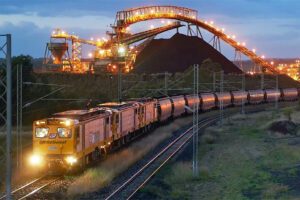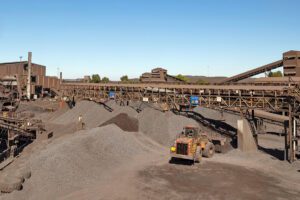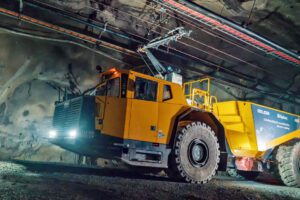1 SOUTH AMERICA
While it would seem odd to expect high blood lead levels in a remote area of the Peruvian Amazon, that is the case. The metal is valuable there, since it is easily moulded to make perfect weights for fishing lines and nets. That convenience comes at a cost.
Three out of every four children in communities in the Corrientes River basin have blood lead levels higher than those considered excessive under US health guidelines.
The lead strips from electrical cables found inside the homes solved a mystery that had long puzzled researchers. Scientists had expected to find that water polluted by oil drilling upriver was responsible but, to their shock, they discovered that the children and teens were fashioning homemade fishing sinkers from scrap lead with their teeth.
Experts say that there is no safe lead level for children.
Source: Mining and Resource Contractors Safety Training Association
2 UNITED STATES
Final data for 2012 released by the MSHA (Mine Safety and Health Administration in the US) indicates that the lowest fatality and injury rates in the history of US mining occurred in 2012. In coal mining, 20 miners died, the second lowest level ever recorded and the rate of reported injuries was the lowest ever recorded. (Number of employees 137,650. Fatality incidence rate per 1,000 employees was 0.145).
In metal and non-metal mining, 16 miners died, equalling the record low set in 2011 and the reported injury rate was also a record low (Number of employees 250,228. Fatality incidence rate was 0.064).
In July, the US Chemical Safety Board held a public meeting in Washington DC at which its members were asked to agree to a ‘most wanted’ status for a combustible dust standard.
The Board was not satisfied that OSHA had adequately implemented three previous recommendations following major disasters which occurred in 2001, 2005 and 2009.
If agreement is reached by the Board members it will result in that designation to be the first in CSB’s history.
Source: Mining and Resource Contractors Safety Training Association
3 NETHERLANDS
Surveys carried out by Dutch and Belgian trade unions have produced similar findings – that communication tools (smart phones, laptops etc.) are blurring the dividing line between work and personal time.
Sixty per cent of respondents had to be contactable during their free time or when travelling between home and work and 68 per cent regarded electronic communication tools as stressors during working hours.
Workers were also polled on the physical risks of using these devices with 23 per cent claiming to suffer from painful hands, wrists, fingers, neck, shoulders or arms. Sixty two per cent thought that their health ‘may well be’ at risk.
Importantly, only nine per cent thought that their employers had carried out a specific risk analysis associated with the new technologies.
Source: Mining and Resource Contractors Safety Training Association
4 POLAND
Three people were killed and another sustained injuries when an electric cable fell from the roof of an elevator at a mine in southern Poland in late August.
The four workers were installing the electric cable in the elevator at the Myslowice-Wesola coal mine when the accident occurred. The workers were 320 metres underground at the time of the incident.
Myslowice-Wesola coal mine is operated by KHW and is located in the south of Poland in Katowice, Silesian Voivodeship, 260 km southwest of the capital Warsaw.
The men were employees of Kopex- PBS, a company which constructs and consolidates mine shafts.
An investigation into the cause of the accident is under way.
Source: www.globalpost.com
5 SOUTH AFRICA
In August, South Africa’s second largest platinum mining company, Impala Platinum (Implats), said it had virtually eliminated what has long been the scourge of South Africa’s underground mines – fall-of-ground fatalities.
Impala Platinum CEO Terence Goodlace claims the company has not had a fall-of-ground fatality for 12 months, a result he attributes to the company’s use of overhead nets and bolt systems.
Nets and bolts have been implemented on 90% of the Impala Platinum mine’s Merensky reef horizon and in 45% of its upper group two stopes.
In July, two men were killed by a rockfall at an underground mine in South Africa’s north west, near the town of Rustenburg.
The incident occurred when the two men were engaged in drilling at Anglo American’s (Amplats) Bathopele Mine.
Investigations into the exact cause of the accident are continuing.
6 INDIA
Fourteen members of the public were killed when a wall of coal collapsed and buried them at a coal mine in India’s State of Odisha in August.
The victims were people from a nearby village who were collecting coal from the mine’s overburden dump yard when the incident occurred.
Five people were rescued from the heap with injuries and were immediately taken to a nearby hospital.
The five-day rescue operation was hampered by the fact that police were unsure how many people were in the immediate area when the coal dump collapsed.
The accident occurred in the Sundargarh district at the Kulda open cast Basundhara-Garjanbahal coal mine operated by Mahanadi Coalfields Limited (MCL).
Entry to the coal dump area is prohibited however locals often scavenge for coal at the dump site, despite warning signs erected by the company.
Chief Minister, Naveen Patnaik, has ordered a probe into the incident by the local Revenue Divisional Commissioner.
Source: articles.timesofindia
7 China
A Chinese coal mining company has been charged with concealing the real death toll from a massive gas explosion in north-east China’s Jilin Province in March.
China’s State Council claims that the company only reported 28 deaths and 13 injuries to avoid investigation while the actual death toll amounted to 36.
In April, the State Administration of Work Safety ordered the provincial government to verify casualty numbers after receiving a tip-off that the company had grossly under-reported the number of fatalities.
The explosion occurred around 10am on 29 March at Tonghua Mining Group’s Babao Coal Mine near Baishan City.
Another gas explosion happened at the same mine in April when the company sent workers back down the shaft to work, disregarding a government ban on all operations. A total of 17 people died and eight were injured in the accident.
Source: www.English.news.cn
8 NEW ZEALAND
The families of victims of the Pike River mine disaster were told in July that police would not be prosecuting any mine official over the November 2010 disaster that claimed the lives of 29 men.
Lawyers, on behalf of the families, are calling for the law to be changed, saying there should be a charge of corporate manslaughter.
Currently under New Zealand law, companies as well as government departments cannot be held criminally liable for accidental deaths.
The families are now considering civil action according to lawyers.
Speaking to the New Zealand Herald, Detective Superintendent Peter Read, said there was insufficient evidence to lay manslaughter charges.
“There was enough evidence for criminal nuisance charges but that raised double jeopardy issues, with former mine manager Peter Whittall also being prosecuted by the Ministry of Business, Innovation and Employment”, Mr Read said.
In September, Pike River families received the welcome news that the NZ Government had approved a plan to re-enter the mine. The plan will see recovery teams enter and explore the main tunnel up to the rock fall and hopefully learn more about conditions in the mine in the lead up to the explosion.
Source: www.nzherald.co.nz













Add Comment